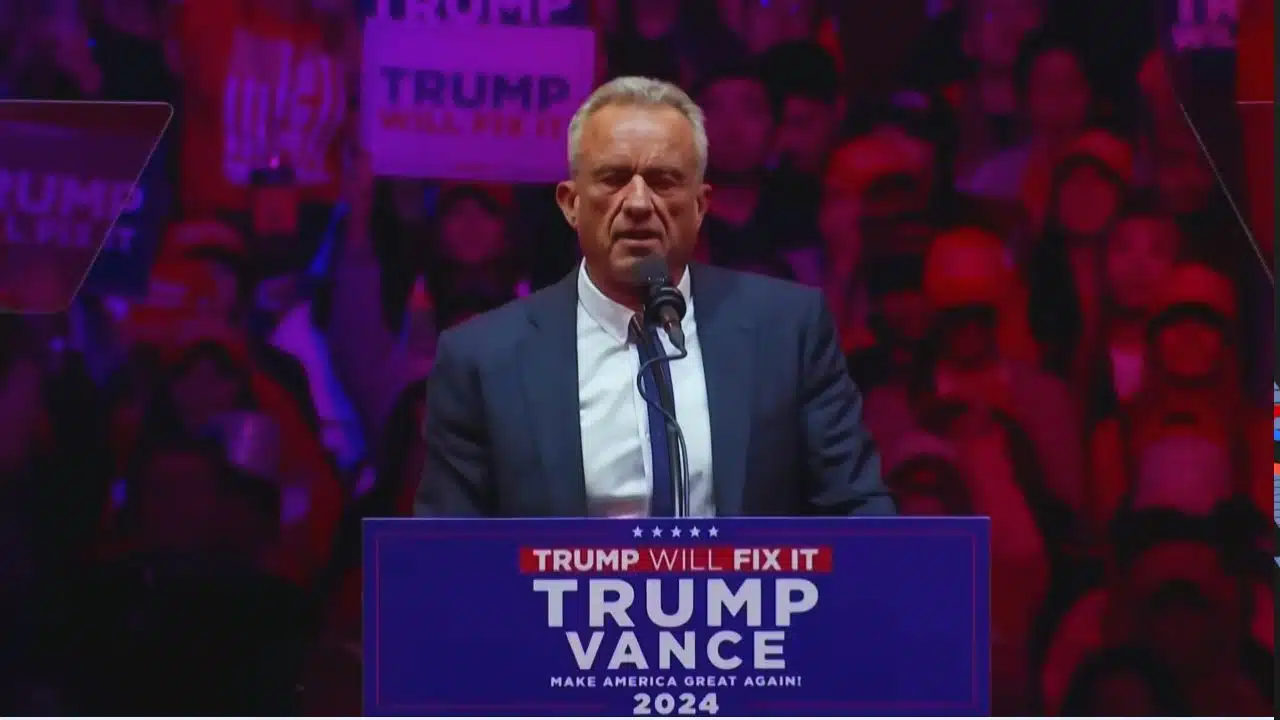In recent weeks, some key allies of President-elect Donald Trump have reportedly floated the idea of Robert F. Kennedy Jr. leading the U.S. Department of Health and Human Services (HHS).
The consideration comes amid a renewed Republican majority in the Senate, which could support Kennedy’s confirmation despite his controversial public health views. Here’s an in-depth look at the dynamics surrounding this possible appointment and the policy changes Kennedy might bring to the role.
Kennedy’s Potential Path to HHS and Senate Confirmation
The suggestion of Kennedy for the HHS role has gained traction within Trump’s circle, especially with the increased likelihood of a smoother confirmation process in a Republican-majority Senate. In recent years, Kennedy has been vocal about his stance on vaccines and health policies, which many health professionals criticize as “anti-science.” His positions include the claim that no vaccine is completely safe, a statement that health experts argue could weaken U.S. vaccination efforts and public trust.
Kennedy, however, has yet to commit to a possible nomination. Before the election, he expressed uncertainty about whether HHS would be the best fit for him. However, with rising speculation and post-election developments, Kennedy acknowledged that leading HHS could now be “a possibility,” depending on the president’s strategy.
Divisive Public Health Stances
Kennedy’s past remarks, such as his skepticism about vaccine safety and support for his organization, Children’s Health Defense, which links rising chronic disease rates with increased childhood vaccinations, have raised concerns. Many in the medical community argue that such claims are misleading and could contribute to a decline in vaccination rates. Kennedy’s views align with his “Make America Healthy Again” platform, a campaign agenda focused on addressing chronic disease, reducing pharmaceutical influence, and increasing health transparency.
Alternative HHS Candidates and Political Dynamics
Kennedy is not the only candidate under consideration for HHS. Trump allies have mentioned other potential nominees, such as Dr. Joseph Ladapo, Florida’s state surgeon general, known for his controversial views on COVID-19 booster shots, and former Louisiana Governor Bobby Jindal, who has experience in public health policy. Trump allies have also suggested former HHS Deputy Secretary Eric Hargan, citing his deep familiarity with the department’s operations.
Despite these options, Kennedy’s supporters argue that his close relationship with Trump and shared health goals make him a strong contender. Kennedy and Trump reportedly spent considerable time together during the campaign, with Kennedy playing a significant advisory role in shaping health policy. Trump has previously expressed his willingness to grant Kennedy significant autonomy in addressing public health issues, even encouraging him to pursue ambitious initiatives related to health, food, and medicine, except for fossil fuel restrictions.
Key Proposals in Kennedy’s “Make America Healthy Again” Platform
If appointed, Kennedy’s approach could bring substantial changes to HHS’s role in public health. His campaign platform centers on reforming current health practices that he argues contribute to a “chronic disease crisis” in the U.S. Kennedy’s health strategy includes several key components.
- Increased Transparency and Reduced Pharmaceutical Influence: Kennedy has been vocal about the influence of pharmaceutical companies on health policy and regulatory agencies. He has suggested cutting pharmaceutical advertising and ending the practice of relying on industry-paid fees to fund the FDA’s drug approval process, which he claims creates conflicts of interest.
- Focus on Health and Disease Prevention: Kennedy’s platform advocates for preventative health measures and more natural approaches to well-being. For example, he supports limiting fluoride levels in drinking water, based on studies suggesting potential cognitive impacts on children at higher fluoride concentrations.
- Regulatory Changes at the FDA: Kennedy has openly criticized the FDA for what he calls the “aggressive suppression” of certain products, such as MDMA and raw milk. He suggests reforming the agency to support more health innovations while holding it accountable for transparency in decision-making.
- Environmental Health Standards: Kennedy has expressed concerns about fluoridation in public water supplies and its potential impact on children’s health. Due in part to studies suggesting a link between lower IQ levels in children at higher fluoride concentrations, the Environmental Protection Agency (EPA) recently received a court order to review its fluoridation practices. Kennedy’s views on this issue align with the call for updated EPA guidelines.
Support and Criticism from Health Experts and Allies
While some allies view Kennedy as a passionate and transformational leader, others have reservations about his suitability for HHS. Dr. Robert Malone, a close Kennedy ally, has suggested that Kennedy’s talents might be better suited for a role as a health “czar” in the White House, where he could influence multiple agencies without being tied to the bureaucratic responsibilities of HHS.
Malone and other supporters argue that Kennedy’s vision would involve a significant overhaul of the current health infrastructure, with a focus on long-term health benefits for Americans. However, critics argue that his views could sideline critical public health programs and potentially lead to disruptions in efforts to combat preventable diseases.
What’s Next for Kennedy and Trump’s Health Agenda?
As the new administration takes shape, the prospect of Kennedy at the helm of HHS remains uncertain. While Trump’s team continues to evaluate options, Kennedy’s ideas for reshaping public health policy are already sparking debate across political and medical communities.
For now, Kennedy’s vision for a “Make America Healthy Again” initiative offers insight into the changes he could bring to federal health policies. Whether as HHS Secretary or in a different role, Kennedy’s influence on Trump’s health policies seems likely to continue reshaping the administration’s approach to health and wellness in the United States.
The Information is Collected from NBC News and CBS News.




































